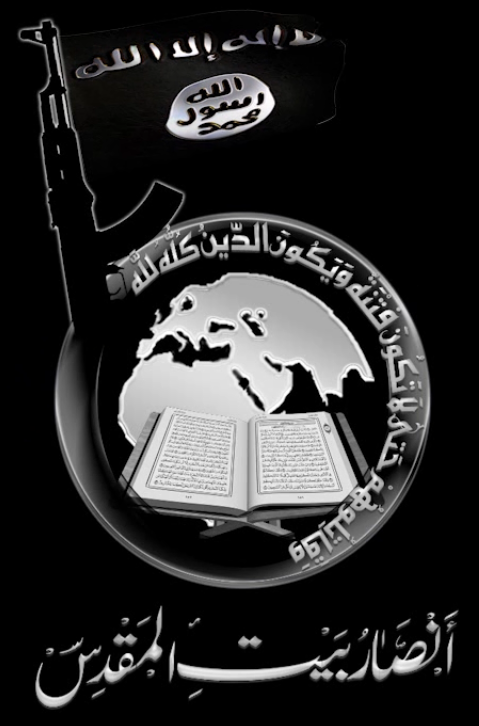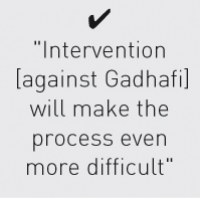![]()
Tue, Sept 3, 2013 | By Jonathan Fighel
Originally published by the Intelligence and Terrorism Information Center (ITIC).
The Concept of Sacrifice in the Muslim Brotherhood’s Doctrine

The Salafi group Ansar Bayt al-Maqdis smuggled weapons and ammunition to the barricaded Muslim Brotherhood members during the weeks of the standoff with the Egyptian army. Recently, Ansar Bayt al-Maqdis claimed responsibility for a rocket attack — using Grad-type missiles — toward Eilat, Israel on Aug 13, 2013. Earlier, on Aug 9, 2013, Ansar Bayt al-Maqdis has said that four of its jihadi fighters were killed in an Israeli drone attack in Egypt’s North Sinai region as they prepared to launch rockets at Israel. (Picture: Jama’at Ansar Bayt al-Maqdis logo / Source: occident.blogspot.com)
One of the main contributions of the Brotherhood to the political-social Islamic revival of these last generations was the development of the concept of the western “crusader” cultural threat to the Muslim world. According to this concept, the Muslim world is under siege and is facing an existential threat which can only be solved with the reestablishment of the greater Islamic state founded on the principles of exclusively Sharia rule. The Muslim Brotherhood developed an integrated approach, where the strategic conflict for the reestablishment of the Islamic state in all or most of the territory that was under Islamic rule over the course of history, is combined with self-defense in face of the war waged against Islam by the western culture and its champions. This self-defense is an uncompromising Jihad against the enemy, a war for all intents and purposes and by any means. It starts by introducing the centrality of Islam in Muslim society through advocacy, education and culture, and moves to the Jihad — either organized as a war, or as what Western political culture define as terrorism.
The Muslim Brotherhood champions the “desire for death through self-sacrifice” (Talab Al-Shada). The movement’s founder in Egypt, Hassan al-Banna, devoted an article to this subject in 1948 in which he defined this sacrifice and coined the term “industry of death” (Sina’at al-Mawt):
“Death is indeed an industry like all other industries. There are those who do it well and know how to die with honor and choose to die in the honorable theater and at the appropriate time. They sell the drops of their blood for the highest possible price and gain through it the greatest earnings a man can imagine”.[1]
One of the commentators on Al-Banna’s doctrine expanded on the Muslim Brotherhood’s “industry of death” saying that,
“The trained believer in the industry of death knows why he is dying in order to better his intentions; he knows when he is going to die so that his death will help with the problems of his nation; he knows how he will die so that his death becomes earning and rescue for us and a loss to the enemy; he knows who he is going to die with so that his Jihad integrates with the Jihad of Allah’s Army (Jundallah) and his death will cause the pushing of the Jihad cart forward.”[2]
A hero cultivated in the Islamic political culture in Egypt and beyond was Khalid al-Islambouli, who led the operation to assassinate President Anwar al-Sadat. Islambouli became an admired role model in the 1980s within the Arab Islamic arena as a man who had committed a suicidal act. He and his partners garnered multiple admiring descriptions, some of which stressed their desire to die, for example in the “Al-Da’awa” publication of the Egyptian Muslim Brotherhood:
“These young heroes did not want life when performing the unprecedented brave act in the theater of self-sacrifice. They devoted themselves to Allah and sold their souls to God who bought them in return for paradise. They will be saddened if they are denied the honor of dying for Allah if their advocates succeed in saving them from the grace of depositing their souls with Allah”.[3]
The Counterrevolution and the Ousting of President Mohammed Morsi
The counterrevolution led by the army and the “Tamrud” movement, the ousting of President Mohammad Morsi and the Muslim Brotherhood from power, and the army’s return to temporarily take the reins of government in Egypt, led the Muslim Brotherhood to the conclusion that they had no real chance of a return to power — a new reality which they do not intend to accept. Attempts by various mediators, including representatives from the West, to locate pragmatic elements within the movement’s leadership who would enter into negotiations for the assembly of a coalition government system enjoying popular and political consensus and bringing back stability to Egypt, were rejected outright by the Muslim Brotherhood whose one and only stand was a return to the previous state of affairs and the reinstating of the deposed President Morsi. The Muslim Brotherhood’s strategy was a “zero sum game”.
In this state of affairs it is clear that the Muslim Brotherhood’s strategy is to go “all out” in a violent and uncompromising struggle, using terrorism, violence and civil disobedience based on the violent zealot conceptual aspect of their ideological doctrine. In the five weeks of the Muslim Brotherhood’s entrenchment in the town squares of Cairo, practical preparations were made for the inevitable violent confrontation with police and army troops that would arrive to evacuate and disperse the barricaded. The time of Jihad arrived, with the confrontation and sacrifice as an ideological structured part of the Muslim Brotherhood’s worldview as an organization who always depict themselves as victims and as the weak side in face of the violent rampant tyranny of the regime for the purposes of pan-Islamic and international propaganda and identification, while creating the pretense that innocent demonstrations to restore democracy were disrupted heavy-handedly.
In the course of the weeks before the Egyptian army launched the campaign to evacuate the town squares, in demonstrations organized by the Muslim Brotherhood and their supporters in support of the deposed president, the element of martyrdom as a central ideological motif was highlighted.
On June 21st 2013, Pro-Morsi Supporters Chant in Favor of Islamic Law and Martyrdom[4]
During a Muslim Brotherhood demonstration on July 3rd 2013, pro-Morsi demonstrators threatened Defense Minister Al-Sisi with suicide squads and the burning of Christians.
“You have created new Mujahideen and new martyrdom-seekers. If one out of ten of these people blows himself up in a crowd, it will be your fault. It is you who have created terrorism. You were the first to use terrorism. If the army deploys in order to betray Morsi’s supporters, we shall all become martyrdom-seekers”.[5]
The Muslim Brotherhood’s Preparations and Confrontation with the Egyptian Army
The standoff of the Muslim Brotherhood, mainly in the two complexes in Cairo, is consistent with the ideology of sacrifice and the wish to be identified as the weak side which advocates non-violence. The standoff was prepared in anticipation of the violence that would come when the Egyptian army would demand the removal of the protesters, at which point the signal for the start of armed violence would be given. Muslim Brotherhood activists used the Rabia Al-Adawiya Mosque as a sanctuary, and women and children hid behind the mosque walls as a human shield. Egyptian sources reported that the radical Salafi organization “Ansar Beit Al Maqdas” (Supporters of Jerusalem), which operates in the Sinai Peninsula and Gaza, smuggled weapons and ammunition to the barricaded Muslim Brotherhood members during the weeks of the standoff. The weapons that reached the Muslim Brotherhood activists, who were barricaded at the Raba Al-Adawiya compound, were kept in hiding until D-Day, and it arrived with the start of the military operation. Khalid Aksha, an Egyptian military commentator, noted that weapons in the possession of the Muslim Brotherhood had been transported through the Sinai Peninsula using the Salafi terrorist organizations. According to him,
“There is a direct relationship between the Muslim Brotherhood and terrorist organizations operating in the Sinai, and the infrastructure of these organizations, and especially that of the Ansar Beit Al-Maqdas organization which is made up of prisoners who escaped upon the outbreak of the revolution in Egypt against President Hosni Mubarak”.
Egyptian sources reported that on the day of evacuation, August 14th 2013, prior to the violent confrontation, the Egyptian Ministry of the Interior used the public address systems belonging to the security forces involved in the evacuation to announce that any demonstrator wishing to leave the Raba Al-Adawiya and Al Nahada compounds would be able to do so freely. The Egyptian security forces opened several safe passages for those wishing to leave voluntarily. The official announcement also promised that no legal action would be taken against the protesters who used the window of opportunity and stopped the violence which was disrupting life in Egypt. The security forces announced:
“We wish to bring back personal security to the citizens of Egypt. Anyone leaving the demonstrations will receive our support and the protection of the security forces….Those who continue to oppose the evacuation and use violence against the security forces will encounter a heavy hand. We will not surrender to parties wishing to harm the Egyptian people”.
In response, the barricaded Muslim Brotherhood activists opened fire from the mosque at police and soldiers, which led to the inevitable and expected escalation, which served the construction of the narrative of sacrifice from the Muslim Brotherhood school of thought.
Using Military Force and the Danger of Losing International Legitimacy
The five basic creeds of the Muslim Brotherhood are:
“Allah is our goal; the Messenger is our leader; the Quran is our constitution, Jihad is our path; death for Allah is our most sublime hope.”[6]
In light of the first three non-violent principles, the movement rose to power in Egypt in the January 25th 2011 revolution, and discussions on a new constitution led to a declaration made by the Egyptian President Mohamed Morsi on December 1st 2012 that a referendum was to be held on the new constitution on December 15th 2012. One can determine that in the event the new constitution in its proposed wording had been approved, and if the government of the Islamic parties had survived, then Egypt would have been heading towards becoming an Islamic Sharia state, similar to countries like Sudan, Iran and Pakistan.
The two additional principles (Jihad is our path; death for Allah is our most sublime hope) constituted the violent ideological foundation. Once the Muslim Brotherhood learned that a counterrevolution led by the army and the liberal forces created an irreversible condition, there was a belief that there was no chance to generate a change in the situation without a violent battle involving the values of Jihad, sacrifice and death.
A cynical perspective would suggest that the Muslim Brotherhood sought and wanted the violent and bloody confrontation, as blood flowing through the streets of Cairo served the movement’s goals in the short and medium term by creating the impression that an army massacring unarmed civilians is illegitimate and not worthy of leading the people. The Egyptian army’s conduct was no surprise and certainly was expected by the Muslim Brotherhood’s leadership who foresaw and prepared for a violent confrontation involving shooting from both sides, even though it was clear that the superior power and skill of the Egyptian army would result in effective targeting of the Muslim Brotherhood’s sources of firepower, killing and injuring unarmed men as well. I believe this situation was expected and planned for in advance by the Muslim Brotherhood to create negative international public opinion against the military rule in Egypt, to present it through media coverage as brute trampling human rights, whose legitimacy to lead Egypt should be revoked. In the spirit of the “Arab Spring” and the West’s intolerance towards the tyrannical Arab regimes and the West’s abandonment (led by the U.S.) of President Mubarak, the Muslim Brotherhood expected the response in the event the conflict became armed and violent — they prepared for that, and were not disappointed.
The Response of the West
Predictably and ironically, several countries in the West (the same West despised by the Muslim Brotherhood, and viewed as a western cultural “Crusader” threat to the Muslim world) initiated an emergency meeting and condemnation at the Security Council. President Obama interrupted his vacation at Martha’s Vineyard and issued a strong declaration of condemnation of the military rule in Egypt and cancelled the bi-annual joint naval maneuvers of the two countries, and harsh phone calls were exchanged between the U.S. Defense Secretary and General A-Sissy. The European Union also issued a statement of condemnation, as well as a declaration that it would examine the continued aid policy to Egypt.
At no stage did these enlightened Western countries advocating human rights, religious freedom and democracy, address or denounce the extreme violence that broke out at the initiative of Islamic elements against the Christian Coptic minority, including the burning of churches and the killing of clergy.
Christians have long suffered discrimination and violence in Muslim majority Egypt, where they make up 10% of a population of 90 million. Attacks increased after the Islamists rose to power in the wake of the 2011 Arab Spring uprising that drove Hosni Mubarak from power, emboldening extremists. But Christians have come further under fire since President Mohammed Morsi was ousted on July 3rd, sparking a wave of Islamist anger led by Morsi’s Muslim Brotherhood.
And the Arab countries? What is their reaction? The reaction usually ranges between feeble denouncing and thunderous silence. The King of Saudi Arabia, who had strongly opposed the Muslim Brotherhood and the rule of Mohammed Morsi, backed the provisional government appointed by the military and promised assistance in the sum of five billion dollars after Morsi’s ousting in early July 2013.
Creating the narrative of victimization, and promoting the Martyrdom ethos, was cynically planned and proved a success for the Muslim Brotherhood who operated in the manner they are familiar with from past decades, even during the rule of Jamal Abdel Nasser, Anwar Sadat and Hosni Mubarak who in most years of their rule saw the Muslim Brotherhood as presenting the danger of turning Egypt into a “Sharia” State, and used various means of brutal oppression against them, while the Western countries and the United States looked on in silence.
The Muslim Brotherhood, who prepared the provocation of initiated violent confrontation, succeeded in creating and establishing in Western public opinion the image of the victim and garnered unjustified sympathy as the weak side. They will continue with the strategy of terrorism and urban guerrilla warfare integrated with civil disobedience in the cities of Egypt against the military and government institutions, for a period whose duration and future are difficult to predict at this stage. There is no doubt that what happened in Cairo and in some rural towns on August 14th 2013 is the beginning of a struggle of historic significance that will determine the future and character of the “Land of the Nile” under the leadership of the provisional government led by General Abdel Fattah a-Sisi.
Jonathan Fighel is ICT Senior Researcher.
![]()
Notes:
[1] Hassan al-Banna, “The Industry of Death”, the fallen imam talks to the youth of the Muslim world (Beirut, Dar Al-Kalam, 1974), pages 129 – 132.
[2] Abd al-Salam Yassin, The Prophetic Path: the Education, Organization and Progress (Cairo, author’s publication) 2nd edition, 1989), pages 377 – 381.
[3] Al-Da’awa, year 32, number 70 (March 1982), page 17.
[6] Ali Abd al-Halim Mahmud, Indoctrination Methods of the Muslim Brotherhood (Al-Mansura, Dar Al-Wafaa’, 1991), second volume, pages 1000 – 1004.



 RSS
RSS










Latest Comments
Hello Mike, Thank you for your positive feedback to the article. I felt there wasn’t too much critical analysis of ...
Thanks for this considered and well constructed article. A follow up article on the manner in which the editorial contro...
THE CLUELESSNESS OF CLAIMING THAT OBAMA'S MIDDLE EAST POLICIES WERE A FAILURE CANNOT BE FURTHER FROM THE TRUTH, WHAT THE...
As long as Obama is the president of the usa do not trust the us government......
Thank you for an good read....